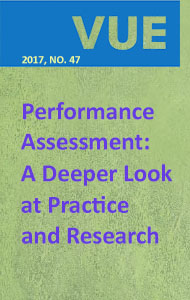A high school sophomore reflects on the limits of and alternatives to high-stakes standardized tests. Ai-Zhen Tung wrote this reflection during her sophomore year at Boston’s Fenway High School.
Performance Assessment: A Deeper Look at Practice and Research

This issue is an online supplement to VUE 46, which addressed the topic of performance assessment – a personalized and rigorous alternative to standardized testing that allows teachers to build on individual students’ strengths and foster more equitable learning outcomes.
VUE 47 adds additional current materials, offers opportunities for additional voices, and provides more examples of performance assessment. Because performance assessment is an active national conversation, the work continues; following VUE 46’s publication, important national conferences and other milestones occurred that we’re able to share here. This issue also provides perspectives from students, educators, researchers, and policymakers.
Four examples spanning grade levels and disciplines demonstrate the range and possibilities of performance assessment. These examples were compiled by Christina Kuriacose, Program Associate, Quality Performance Assessment, Center for Collaborative Education.
This article reports from Stanford University’s Innovative Assessments Institute on the development of performance assessment at scale, along with implementation recommendations.
High school students reflect on their participation in GreenTalks, a public exhibition of their research on food justice issues in Boston. Interviews conducted by Christina Kuriacose, Program Associate, Quality Performance Assessment, Center for Collaborative Education
Researchers report on their evaluation of comparability claims in local scoring of performance assessments across districts participating in New Hampshire’s Performance Assessment of Competency Education pilot project.
This field report from 2017’s National Conference on Student Assessment shares possibilities for flexibility and innovation in assessment and accountability made possible by the Every Student Succeeds Act.
Based on reports created for the National Summit on K-12 Competency-based Education, this article explores how educators can take action to build momentum for and implement competency education and performance assessment.
In an examination of the conditions required for the successful implementation of performance assessment, the authors draw on a range of personal experience and other insights to guide practitioners and policymakers.








